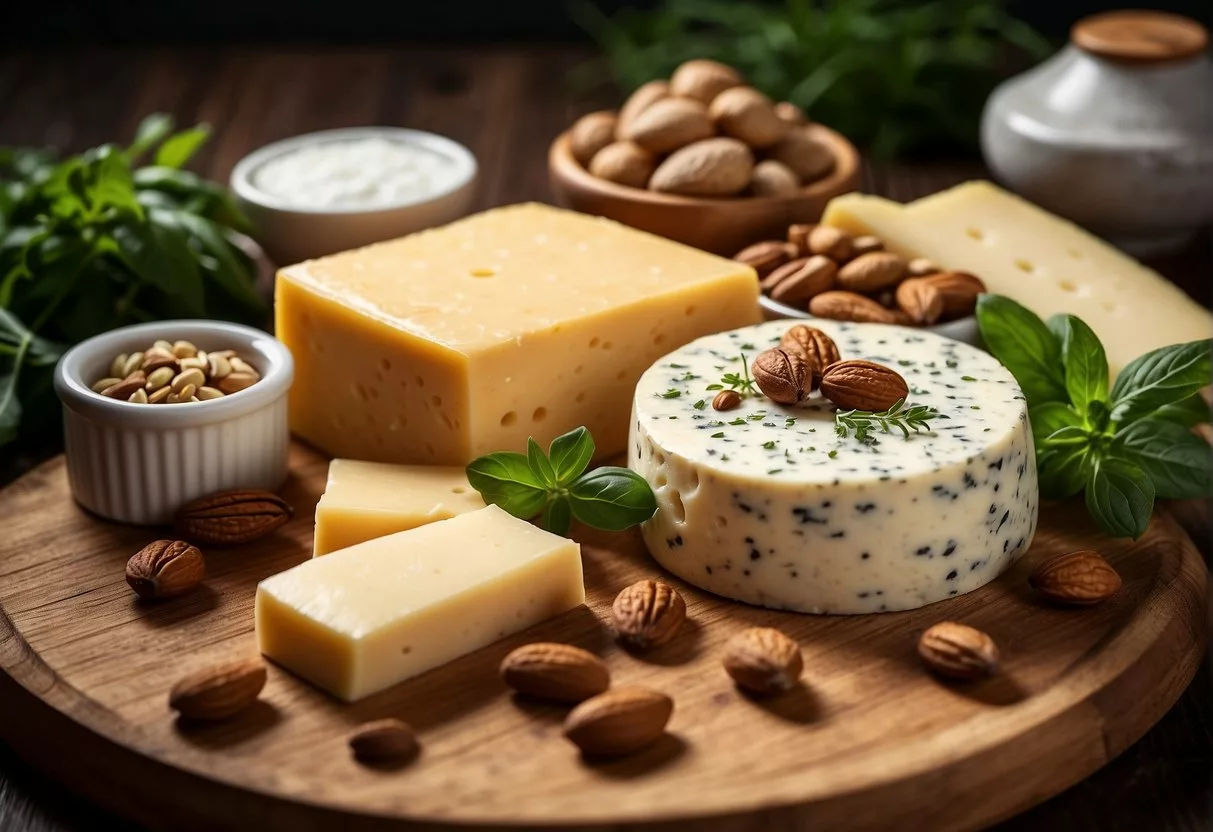Cheese is a beloved food that has been enjoyed by people for centuries. It is a versatile ingredient that can be used in a variety of dishes, including salads, sandwiches, and pizzas. Cheese is also a great source of protein and calcium, making it a popular food choice for those following the keto diet.

The keto diet is a high-fat, low-carb diet that has been shown to help people lose weight and improve their overall health. When following the keto diet, it is important to choose the right types of cheese to ensure that you stay in a state of ketosis. In this article, we will explore the different types of keto-friendly cheeses and how you can incorporate them into your diet.
Key Takeaways
- Cheese is a versatile food that can be used in a variety of dishes.
- The keto diet is a high-fat, low-carb diet that can help people lose weight and improve their overall health.
- Choosing the right types of cheese is important when following the keto diet.
Types of Keto-Friendly Cheeses

When following a keto diet, it is important to choose keto-friendly cheeses that are low in carbohydrates and high in fat. Fortunately, there are many types of cheese that fit this criteria. Here are some of the most popular types of keto-friendly cheeses:
Hard Cheeses
Hard cheeses are a great option for those following a keto diet as they are typically low in carbohydrates and high in fat. Some popular hard cheeses include cheddar, parmesan, gouda, and Swiss cheese. Hard cheeses are also a good source of protein, calcium, vitamin A, and vitamin B12.
Soft Cheeses
Soft cheeses, such as blue cheese and cream cheese, are also keto-friendly options. While they may be slightly higher in carbohydrates than hard cheeses, they are still a good source of fat and protein. Soft cheeses are also a good source of calcium and vitamin K2.
Fresh Cheeses
Fresh cheeses, such as feta cheese, mascarpone, and cottage cheese, are also keto-friendly options. These cheeses are typically lower in fat than hard and soft cheeses, but they are still a good source of protein. Fresh cheeses are also a good source of calcium and vitamin B12.
Processed Cheeses
Processed cheeses, such as American cheese, are typically not the best option for those following a keto diet. These cheeses often contain additives and preservatives, and they may be higher in carbohydrates than other types of cheese. However, some processed cheeses, such as mozzarella and ricotta cheese, can be keto-friendly options when consumed in moderation.
In summary, there are many types of keto-friendly cheeses to choose from, including hard cheeses, soft cheeses, fresh cheeses, and some processed cheeses. When selecting cheese, it is important to consider the fat content, protein content, and carbohydrate content, as well as any other nutritional benefits such as calcium and vitamins.
Health Considerations

Nutritional Benefits
Cheese is a popular food item that can be included in a ketogenic diet. It is a good source of protein, calcium, and vitamin D. Cheese also contains healthy fats, including saturated fats, which are essential for energy production and hormone regulation. Some types of cheese, such as cheddar, contain conjugated linoleic acid (CLA), which has been shown to have anti-inflammatory and anti-cancer properties.
Potential Risks
Although cheese is a healthy food item, it is important to consume it in moderation. Cheese is high in saturated fats, which can increase the risk of heart disease if consumed in excess. Additionally, some people may be lactose intolerant and should avoid consuming cheese or opt for lactose-free varieties.
Dietary Balance
When incorporating cheese into a ketogenic diet, it is important to maintain a proper balance of macronutrients. Cheese is low in carbohydrates and high in fat, making it a good choice for those following a low-carb, high-fat diet. However, it is important to monitor portion control and carbohydrate intake to ensure that nutrient ratios are maintained and blood sugar levels are stable.
In conclusion, cheese can be a healthy and delicious addition to a ketogenic diet when consumed in moderation. It provides a good source of protein, calcium, and healthy fats, but should be consumed in balance with other nutrient-dense foods. By monitoring portion control and carbohydrate intake, cheese can be enjoyed as part of a healthy and balanced ketogenic diet.
Incorporating Cheese into a Keto Diet

Cheese is a delicious and versatile food that can be incorporated into a keto diet in a variety of ways. It is a great source of both fat and protein, making it an ideal choice for those following a low-carb, high-fat diet. Here are a few tips for incorporating cheese into your keto diet:
Meal Planning
When planning your meals, be sure to include a variety of keto-friendly cheeses. Some great options include cheddar, parmesan, feta, brie, and goat cheese. You can use cheese to add flavor and texture to salads, vegetables, and eggs. You can also use it as a snack by pairing it with nuts or veggies.
Keto Recipes
There are many keto recipes that incorporate cheese. Some popular options include keto pizza, cauliflower mac and cheese, and cheese-stuffed meatballs. These recipes are a great way to add variety to your diet and keep you satisfied.
Shopping Tips
When shopping for cheese, look for high-quality, full-fat cheese. Variations like grass-fed and fresh cheese are also great options. Avoid processed cheese products, as they often contain added sugars and other additives. Be sure to read the labels carefully and choose cheeses that are low in carbs and high in fat.
In conclusion, cheese is a great addition to a keto diet. It is a delicious and versatile food that can be used in a variety of ways. By incorporating cheese into your meal planning, trying out keto recipes that include cheese, and choosing high-quality, low-carb options, you can enjoy the many benefits of this delicious food while still losing weight and maintaining your energy levels.
Avoiding Common Pitfalls

When it comes to following a keto diet, cheese can be a great source of fat and protein. However, not all cheese is created equal, and it’s important to choose wisely to avoid common pitfalls.
Understanding Labels
Reading labels is crucial when it comes to selecting cheese on a keto diet. Cheese products can contain additives, preservatives, and sugars that can add up quickly and sabotage your keto goals. Look for cheese that is labeled “natural” or “organic,” as these are less likely to contain unwanted ingredients. Additionally, be mindful of the carb count in cheese, as some varieties can be higher in carbs than others.
Managing Dairy Sensitivities
For those with lactose intolerance or other dairy sensitivities, cheese can be a tricky food to navigate. Hard cheeses, such as cheddar or parmesan, are typically lower in lactose and may be better tolerated. However, some individuals may also have issues with casein, a protein found in dairy products. In these cases, it may be necessary to avoid cheese altogether or opt for non-dairy alternatives.
Navigating Non-Dairy Options
For those who cannot or choose not to consume dairy, there are several non-dairy cheese options available. Some popular options include nut-based cheeses, such as those made from almonds or cashews, and seed-based cheeses, such as those made from hemp or sunflower seeds. However, it’s important to note that these options may be higher in carbs and lower in protein than traditional dairy cheese.
Overall, cheese can be a great addition to a keto diet when chosen wisely. By understanding labels, managing dairy sensitivities, and navigating non-dairy options, individuals can enjoy cheese while still staying on track with their keto goals.
Frequently Asked Questions
Which cheeses have the lowest net carb content for a keto diet?
Cheeses that have the lowest net carb content include hard, aged cheeses such as cheddar, parmesan, and gouda. These cheeses contain less than 1 gram of carbs per ounce, making them an excellent choice for those following a keto diet.
Can mozzarella cheese be included in a ketogenic eating plan?
Mozzarella cheese is a great option for those following a ketogenic eating plan. It is low in carbs, with less than 1 gram of carbs per ounce. Mozzarella cheese is also high in protein, making it a filling and satisfying choice.
Is cheddar cheese considered keto-friendly?
Cheddar cheese is a popular choice for those following a keto diet. It is low in carbs, with less than 1 gram of carbs per ounce. Cheddar cheese is also high in fat, making it a great choice for those looking to increase their fat intake on a keto diet.
What are the best types of cheese to consume on a keto diet?
The best types of cheese to consume on a keto diet include hard, aged cheeses such as cheddar, parmesan, and gouda. These cheeses are low in carbs and high in fat, making them an excellent choice for those following a keto diet. Soft cheeses such as brie and camembert are also good options, as they are high in fat and low in carbs.
How does feta cheese fit into a ketogenic dietary regimen?
Feta cheese is a great option for those following a ketogenic dietary regimen. It is low in carbs, with less than 1 gram of carbs per ounce. Feta cheese is also high in fat, making it a filling and satisfying choice.
What should I look for when choosing cream cheese for a keto diet?
When choosing cream cheese for a keto diet, look for options that are high in fat and low in carbs. Avoid cream cheeses that contain added sugars or other fillers. Plain, full-fat cream cheese is a great choice for those following a keto diet.
To get your Customized Keto Diet Plan NOW, please take this quiz.
To get 3 Keto Cookbooks for FREE, go here.
